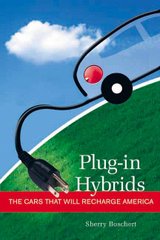No, I'm not referring to John McCain or the other remaining defenders of the Iraq adventure, predicated on so many lies. I'm speaking about Mark Phelan, columnist for the Detroit Free Press. You see Phelan was in North Carolina recently to test drive the new Toyota Tundra. one of the ever-larger vehicles that has catapulted Toyota's profitability. 15 miles per gallon, thank you very much. As Toyota planned it, we see Prius, they sell Tundra. But that's another story.
As Phelan tells this tale, (registration required) midway through their Tundra talk, Ernest Bastien, Toyota Motor Sales vice president for vehicle operations, surprisingly rose to defend GM. '"The movie 'Who Killed the Electric Car?' was terribly one-sided," he said intensely.' Phelan assures us this is conventional wisdom at dinner parties in Detroit, but this "completely unexpected" aside from Toyota surprised him.
Then comes the real shocker. "If it's not surprising enough to hear Toyota defending GM, try this on for size: The film's director pretty much agrees." As Jon Stewart would say: Whaaaa? Phelan quotes Chris Paine: "'We let Toyota off the hook for how they subverted the program' to sell electric cars because GM had a higher profile." See? The director concedes the film is unfair. Of course Paine was saying Toyota was just as actively involved in the killing, supplying more not less ammunition for the film's thesis. But he had to tell the story in 90 minutes. Just as in a newspaper column, you make a comprehensible narrative, hopefully based on a truthful "facts," giving competing viewpoints voice, to convey the larger story. That's what Paine did, giving auto guys plenty of screen time.
That's not what Phelan did. The conventional wisdom about the electric car is under attack. From the film to the agreements reached between Toyota and Ford with Plug In America to keep electric cars on the road to automakers own statements of late about plug-in hybrids and the "electrification of the automobile," the notion that the electric car failed due to its own shortcomings is slowly coming undone. None of this is reflected in the column, despite the author's having contacted and spoken with a representative of Plug In America in preparation for the column.
Phelan uses the conceit of automaker and filmmaker agreement on the unfairness of the film to shlepp out the same tired lies about what brought the electric car programs of the majors to an end. Just as Dave Hermance's final appearance at CARB in September mystifyingly rehashed the tired, inaccurate justifications offered up three years earlier, Phelan ignores the facts on the ground. PIA member Mike Kane's point by point response to Hermance's presentation provides an explanation of how the RAV4 EV Retail Program actually went down.
Toyota's motivation is understandable. As it is with all the majors, they perceive the postponement of the inevitable grid-connected car to be job one. No company wants to be first, to open the door to a future that portends a radical reshaping of the industry. Better to squeeze every last dollar out of the unchallenged, petroleum-swallowing internal combusion engine.
But what motivation Mr. Phelan? Why did an aside about one-sidedness turn into a one-sided column airing the automakers preferred narrative with no rebuttal other than the director's (who already "admitted" the film is unfair)? Phelan is a long-standing defender of the automakers views on the subject, and perhaps he takes the industry at its word. "Ernest Bastien deserves credit for sticking up for the truth," his column concludes. Whose truth?
I don't mean to pick on Phelan. Really. But his latest column is all too reflective of journalists lack of fair reporting on the electric car story, when they have bothered to cover it at all. As Paine himself has said, he made the film because he got tired of waiting for the media to pick up the story.
Paine deserves our thanks. His film shone a spotlight on a great underreported story, and industry has had to respond, even if in disingenous asides "defending" the competition to friendly columnists.
Wednesday, December 20, 2006
Subscribe to:
Comments (Atom)


